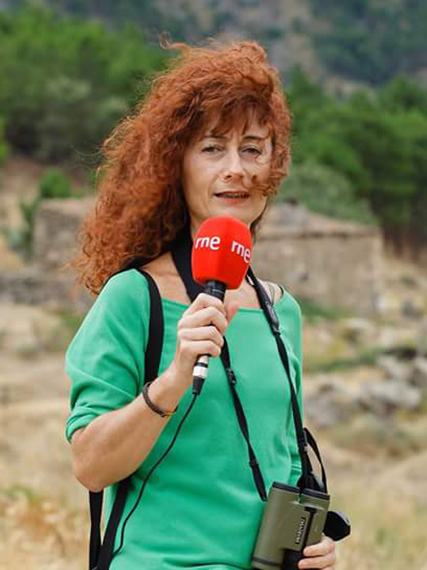CONTRIBUTION
Since 2008, Josefina Maestre Zango (Madrid, 1963) has directed Reserva natural on Radio 5, the longest-standing national radio program dedicated to the environment, on air now for over two decades. “It is to be welcomed that public radio has made a sustained commitment to environmental reporting in the charge of specialist professionals,” says Maestre, the more so when its content “directs listeners towards citizens’ action. We are public servants fulfilling a social function.”
In her Sunday appointment with Reserva natural listeners, Maestre invites them to reflect on the relationship between human beings and their environment, biodiversity conservation and sustainable development, the ecological transition, responsible consumption and social participation, without forgetting the economic, cultural and historical aspects of nature. Asked about the show’s longevity, she says “it’s the range of topics to do with having a healthy life and a healthy environment that gets people hooked on this type of content.”
The award citation refers to her over 30-year trajectory “reporting with scientific rigor and an accent on environmental awareness and citizen participation”; a professional commitment that dates back to 1991, just a year before the now mythical Río de Janeiro Earth Summit, when she took on the editorship of the pioneering magazine Ecología y sociedad.
“I was in touch with a group of journalists and we felt there was a need for a general-interest publication that would put out this type of information, bringing issues like the deterioration of nature or water and air pollution to the public. It was a project that marked me and encouraged me to venture further into this branch of specialized journalism.”
Following this experience, she wrote regularly for publications like the Biosfera supplement of Diario 16 or the weekly supplement of El País, until 1996 when she joined Radio 5 and began her 16 years stint at the helm of Naturaleza y medio ambiente, as well as contributing on an occasional basis to general public radio programs with environmental sections.
Maestre declares herself fascinated with radio, her favorite medium, since it offers “the chance not just to give the news headlines, but to tell a longer story, because we have language in our favor. We transmit images to the listener through voice and a good narrative.”
She has combined her work as a journalist with that of environmental educator via Reserva natural extra, a radio project taking her to secondary schools where she has interacted live with more than 3,000 students from what she describes as “the generation that holds the key to turning around the ecological emergency and biodiversity crisis we are now living through.” The program also featured interviews with renowned naturalists, researchers, writers, musicians and athletes.
In addition, Maestre has extensive experience in publishing projects on biodiversity and the environment, as a member of the founding group of two specialized publishers, Calenda and Viento Norte.
An ornithology enthusiast, she coordinated the SEO/Birdlife documentary film series Pajareros, with eleven editions to date.
Conscious of the emerging threat of disinformation, she stresses the importance of environmental reporters as “a vehicle for the voice of scientists and legislators to reach the public, which is of vital importance if science and politics are to advance.” More than ever, she believes, “we have to defend a journalism based on credible sources that presents the news with scientific rigor.”

